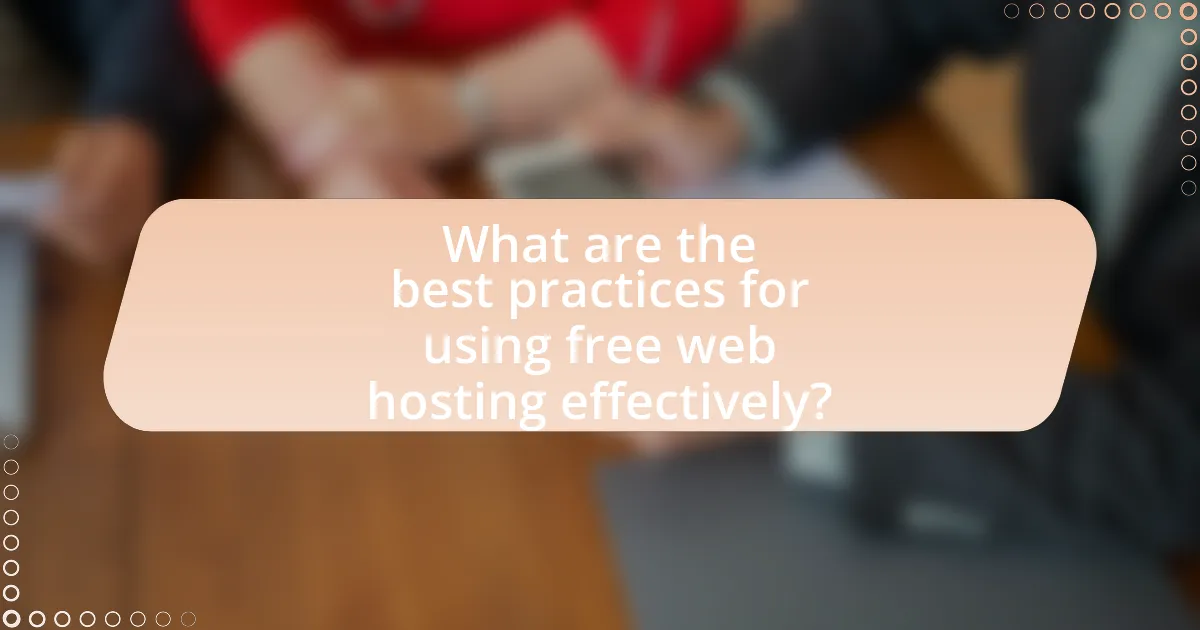The article focuses on the essential features to consider when selecting free web hosting services. Key aspects include limited storage space, bandwidth restrictions, subdomain usage, and the presence of advertisements, all of which can impact website performance and user experience. It discusses the importance of server uptime, bandwidth, and security features such as SSL certification and malware protection. Additionally, the article highlights common limitations of free hosting, such as restricted customer support and potential hidden fees, while providing best practices for optimizing website performance and security on free hosting platforms.

What are the Essential Features of Free Web Hosting?
The essential features of free web hosting include limited storage space, bandwidth restrictions, subdomain usage, and the presence of advertisements. Free web hosting services typically offer a small amount of disk space, often ranging from 500 MB to 2 GB, which is suitable for basic websites. Bandwidth is also limited, usually allowing only a few hundred megabytes of data transfer per month, which can restrict site traffic. Users are often provided with a subdomain (e.g., yoursite.freehost.com) instead of a custom domain, which can affect branding. Additionally, many free hosting providers display advertisements on users’ sites, which can detract from the user experience. These features are common across various free hosting platforms, making them essential considerations for users seeking no-cost options.
How do these features impact website performance?
Website performance is significantly impacted by features such as bandwidth, storage, uptime guarantees, and customer support. High bandwidth allows for faster data transfer, which enhances loading times; for instance, a study by Google indicates that a one-second delay in loading time can reduce conversions by 7%. Adequate storage ensures that websites can host necessary content without slowdowns, while uptime guarantees, typically above 99.9%, ensure that websites remain accessible to users, directly affecting user experience and search engine rankings. Additionally, responsive customer support can resolve technical issues quickly, minimizing downtime and maintaining optimal performance.
What role does server uptime play in free web hosting?
Server uptime is critical in free web hosting as it directly affects the availability and reliability of hosted websites. High server uptime ensures that websites are accessible to users without interruptions, which is essential for maintaining user trust and engagement. For instance, a server uptime of 99.9% means that a website could be down for only about 8.76 hours per year, while lower uptime percentages can lead to significantly more downtime, negatively impacting user experience and potentially leading to loss of traffic and revenue. Therefore, reliable server uptime is a fundamental feature to consider when evaluating free web hosting options.
How does bandwidth affect user experience on free web hosting?
Bandwidth directly impacts user experience on free web hosting by determining the amount of data that can be transferred between the server and users. Limited bandwidth can lead to slower loading times, increased latency, and potential downtime, which frustrates users and may result in higher bounce rates. For instance, if a website exceeds its bandwidth limit, it may become inaccessible, leading to a negative perception of the site’s reliability. Studies show that a one-second delay in page load time can reduce conversions by 7%, highlighting the critical role bandwidth plays in maintaining a positive user experience.
What security features should be considered in free web hosting?
Free web hosting should include essential security features such as SSL certificates, regular backups, malware scanning, and firewalls. SSL certificates encrypt data transmitted between the user and the server, protecting sensitive information. Regular backups ensure that data can be restored in case of loss or corruption, while malware scanning detects and removes harmful software that could compromise the site. Firewalls act as a barrier between the web server and potential threats, blocking unauthorized access. These features collectively enhance the security of free web hosting services, making them safer for users and their data.
How important is SSL certification for free web hosting?
SSL certification is crucial for free web hosting as it ensures secure data transmission between users and the website. Without SSL, sensitive information such as passwords and credit card details can be intercepted by malicious actors. According to a 2021 study by Google, websites with SSL certificates are perceived as more trustworthy, leading to higher user engagement and conversion rates. Additionally, major web browsers like Chrome and Firefox flag non-SSL sites as “Not Secure,” which can deter visitors. Therefore, SSL certification significantly enhances the security and credibility of free web hosting services.
What measures are taken to protect against malware in free web hosting?
Free web hosting providers implement several measures to protect against malware, including regular security updates, malware scanning, and firewalls. Regular security updates ensure that the hosting environment is patched against known vulnerabilities, while malware scanning detects and removes malicious software before it can affect users. Additionally, firewalls are employed to monitor and control incoming and outgoing network traffic based on predetermined security rules, effectively blocking unauthorized access. These combined strategies help maintain a secure hosting environment and protect users from potential malware threats.
What limitations should users be aware of in free web hosting?
Free web hosting typically comes with several limitations that users should be aware of. These limitations often include restricted storage space, which can hinder the ability to host larger websites or files; limited bandwidth, potentially leading to slow loading times or downtime during high traffic; and the presence of ads, which can detract from the user experience and professionalism of the site. Additionally, free hosting services may lack customer support, making it difficult for users to resolve issues promptly. Security features are often minimal, increasing vulnerability to attacks. According to a study by HostingAdvice, 70% of free hosting services do not provide adequate security measures, which can expose users to significant risks.
How do storage limits affect website scalability?
Storage limits directly impact website scalability by restricting the amount of data a website can handle as it grows. When a website reaches its storage capacity, it cannot accommodate additional content, user data, or functionality, which can hinder performance and user experience. For instance, a website with a storage limit of 1 GB may struggle to support a growing user base or an increase in multimedia content, leading to slow load times or downtime. This limitation can ultimately affect the website’s ability to scale effectively, as it may require costly upgrades or migrations to more robust hosting solutions to meet increasing demands.
What are the implications of having ads on free web hosting services?
Having ads on free web hosting services typically implies a trade-off between cost and user experience. Users benefit from free hosting but face potential drawbacks such as reduced website professionalism, slower loading times due to ad scripts, and limited control over the content displayed. Research indicates that 70% of users find ads on websites distracting, which can lead to higher bounce rates and lower engagement (Nielsen Norman Group, 2021). Additionally, the presence of ads may deter visitors, impacting the site’s credibility and user trust.

How do I choose the right free web hosting service?
To choose the right free web hosting service, evaluate essential features such as storage capacity, bandwidth limits, uptime reliability, and customer support. A service that offers at least 1 GB of storage and 10 GB of bandwidth is generally sufficient for small websites. Uptime should be at least 99.9% to ensure your site remains accessible, and responsive customer support is crucial for resolving issues quickly. Research shows that many free hosting services may impose restrictions or ads, so select one that aligns with your specific needs without compromising performance or user experience.
What criteria should I use to evaluate different free web hosting options?
To evaluate different free web hosting options, consider criteria such as storage space, bandwidth, uptime reliability, customer support, and ease of use. Storage space determines how much data you can host, while bandwidth affects the amount of traffic your site can handle. Uptime reliability is crucial, as a higher percentage indicates better availability; for instance, a host with 99.9% uptime is generally more reliable. Customer support is important for resolving issues quickly, and ease of use ensures that even beginners can manage their sites effectively. These criteria help ensure that the chosen hosting service meets your specific needs and expectations.
How can user reviews influence my choice of free web hosting?
User reviews significantly influence the choice of free web hosting by providing firsthand insights into the performance, reliability, and customer support of hosting services. These reviews often highlight specific experiences, such as uptime reliability, speed, and ease of use, which can guide potential users in making informed decisions. For instance, a study by BrightLocal found that 91% of consumers read online reviews, indicating their importance in shaping perceptions and choices. Additionally, platforms like Trustpilot and G2 aggregate user feedback, allowing prospective users to compare different hosting options based on real user experiences, thus reinforcing the credibility of the reviews.
What should I look for in terms of customer support for free web hosting?
When evaluating customer support for free web hosting, prioritize availability, responsiveness, and support channels. Availability should include 24/7 support options, as issues can arise at any time. Responsiveness is crucial; look for providers that guarantee quick response times, ideally within a few hours. Support channels should be diverse, including live chat, email, and forums, allowing users to choose their preferred method of communication. According to a survey by HostingAdvice, 70% of users consider responsive customer support a key factor in their satisfaction with hosting services.
What are the common pitfalls to avoid when selecting free web hosting?
When selecting free web hosting, common pitfalls to avoid include limited bandwidth and storage, which can hinder website performance and accessibility. Many free hosting services impose strict limitations on data transfer and disk space, leading to slow loading times and potential downtime. Additionally, lack of customer support is a significant issue; free hosting often provides minimal assistance, making it difficult to resolve technical problems. Security vulnerabilities also pose a risk, as free hosts may not offer adequate protection against cyber threats, leaving websites exposed. Lastly, the presence of ads on free hosting platforms can detract from user experience and professionalism, as many services display intrusive advertisements on hosted sites.
How can hidden fees affect my experience with free web hosting?
Hidden fees can significantly diminish your experience with free web hosting by unexpectedly increasing costs and limiting service quality. Many free web hosting providers advertise no upfront fees but may impose charges for essential features such as domain registration, increased storage, or customer support. For instance, a study by HostingAdvice found that 70% of users encountered hidden fees that were not disclosed upfront, leading to frustration and dissatisfaction. This lack of transparency can result in users feeling misled and ultimately dissatisfied with the service, as they may have to pay more than anticipated to access basic functionalities.
What should I be cautious about regarding data ownership in free web hosting?
When using free web hosting, you should be cautious about the potential loss of data ownership, as many providers retain rights to the content hosted on their platforms. This means that your data may be subject to the provider’s terms of service, which often include clauses that allow them to use, modify, or delete your content without your consent. For instance, a study by the Electronic Frontier Foundation highlights that free services frequently monetize user data, raising concerns about privacy and ownership. Therefore, it is crucial to thoroughly review the terms of service and understand the implications for your data before committing to a free web hosting solution.

What are the best practices for using free web hosting effectively?
To use free web hosting effectively, prioritize selecting a provider that offers reliable uptime and sufficient bandwidth. Reliable uptime ensures that your website remains accessible to visitors, while adequate bandwidth prevents slow loading times during peak traffic. Additionally, utilize the available storage wisely by optimizing images and files to save space. Implementing basic SEO practices can enhance visibility, and regularly updating content keeps the site engaging. Lastly, be aware of the limitations of free hosting, such as potential ads and lack of customer support, and plan for future upgrades if necessary. These practices help maximize the benefits of free web hosting while mitigating its drawbacks.
How can I optimize my website on a free web hosting platform?
To optimize your website on a free web hosting platform, focus on minimizing file sizes and using efficient coding practices. Compress images and utilize CSS and JavaScript minification to enhance loading speed, as faster websites improve user experience and search engine rankings. Additionally, leverage caching techniques to reduce server load and improve performance. According to Google, a one-second delay in mobile load times can reduce conversions by up to 20%, highlighting the importance of speed. Implementing these strategies will ensure your website runs smoothly even on limited resources provided by free hosting services.
What strategies can improve loading speed on free web hosting?
To improve loading speed on free web hosting, optimizing images is essential. Large image files can significantly slow down page load times, so compressing images before uploading can enhance performance. Additionally, utilizing a content delivery network (CDN) can distribute content across multiple servers, reducing latency and improving access speed for users in different geographical locations. Minimizing HTTP requests by combining CSS and JavaScript files also contributes to faster loading times, as fewer requests lead to quicker page rendering. Furthermore, leveraging browser caching allows frequently accessed resources to be stored locally on users’ devices, decreasing load times on subsequent visits. These strategies collectively enhance the loading speed of websites hosted on free platforms, which often have limited resources.
How can I ensure my website remains secure on free web hosting?
To ensure your website remains secure on free web hosting, implement strong passwords and enable two-factor authentication. Strong passwords reduce the risk of unauthorized access, while two-factor authentication adds an extra layer of security by requiring a second form of verification. According to a study by Verizon, 81% of data breaches are due to weak or stolen passwords, highlighting the importance of robust password practices. Additionally, regularly updating your website’s software and plugins can protect against vulnerabilities, as outdated systems are often targeted by attackers.
What troubleshooting tips can help with free web hosting issues?
To troubleshoot free web hosting issues, first check the server status to ensure it is operational. Many free hosting services provide a status page or social media updates regarding outages. Next, verify your domain settings, ensuring that DNS records are correctly configured to point to the hosting server. Additionally, clear your browser cache and cookies, as outdated data can lead to loading issues. If problems persist, review any error messages displayed, as they often provide clues to the underlying issue. Finally, consult the hosting provider’s support resources, such as FAQs or forums, which can offer specific solutions based on common problems encountered by users.
How do I resolve common downtime problems in free web hosting?
To resolve common downtime problems in free web hosting, regularly monitor your website’s uptime using tools like UptimeRobot or Pingdom. These tools provide alerts when your site goes down, allowing for immediate action. Additionally, consider switching to a more reliable free hosting provider that offers better uptime guarantees, as many free services have limited resources leading to frequent outages. Research shows that free hosting services often experience downtime rates exceeding 20%, which can significantly impact user experience. By proactively monitoring and choosing a dependable provider, you can effectively mitigate downtime issues.
What steps can I take if my website is running slowly on free web hosting?
To improve the speed of a website running slowly on free web hosting, consider optimizing images and reducing their file sizes, as large images can significantly slow down loading times. Additionally, minimize the use of heavy scripts and plugins, which can also contribute to slow performance. Implementing caching techniques can enhance speed by storing frequently accessed data for quicker retrieval. Furthermore, regularly monitoring website performance using tools like Google PageSpeed Insights can help identify specific issues affecting speed. Lastly, if performance remains unsatisfactory, consider upgrading to a paid hosting plan that offers better resources and support, as free hosting often comes with limitations that can hinder speed.